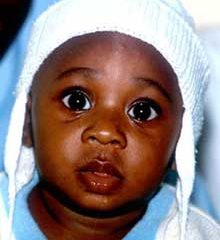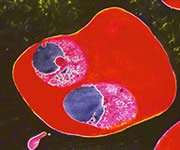Health and Medicine
This subject area encompasses research and studies in the field of human medicine.
Among the wide-ranging list of topics covered here are anesthesiology, anatomy, surgery, human genetics, hygiene and environmental medicine, internal medicine, neurology, pharmacology, physiology, urology and dental medicine.

Modus operandi: how satellites track a mass killer
A global mass killer could be tamed with the aid of satellite technology. Scientists are using data from Meteosat to help model and predict outbreaks of malaria. “Satellite sensor data hold out hope for the development of early-warning systems for diseases such as malaria, which kills between 1 and 2 million people each year,” says David Rogers, of Oxford University’s Department of Zoology.
Rogers is part of a team based in Oxford, Nairobi and at NASA’s Goddard Space Flight Center, Marylan

Fat is spreading
Obesity epidemic sweeps into developing world
Obesity is spreading to all corners of the globe, researchers warned the meeting of the American Association for the Advancement of Science in Boston. Sedentary lifestyles and fast food are causing previously unaffected populations to fall foul of fat.
“Obesity is no longer confined to Western, industrialized societies,” said anthropologist Marquisa LaVelle of the University of Rhode Island, Providence. Guatemalans in the United S

Yellow fever threatens to make a come back
Yellow fever has been written off in the past as a global threat. Yet the failure to eradicate this disease has left the door open for new, large, outbreaks as vaccination of travellers and tropical populations declines, according to an article in the February issue of Microbiology Today magazine from the Society for General Microbiology.
“Yellow fever virus attracts less public attention than, for instance, lassa and ebola, but it remains the greater threat. Containment through effective m

Oversleepers may die early
’Sleeping your life away’ could be more than a saying.
Excessive sleeping may increase your risk of an early death by up to 15%. So hints a new analysis of data collected on one million people by the American Cancer Society. The figures cast doubt on the reputed benefits of eight hours’ sleep a night.
People with the longest lives get only seven hours of sleep each night, find psychiatrists at the University of California, San Diego 1 . Why seven is the magi

New anti-malaria drug
Monkey tests hint compound could paralyse malaria parasite in humans.
A new-found chemical can root out malaria parasites hiding in red blood cells and stop them reproducing. It may become a much-needed new weapon in the war against one of the world’s biggest killers.
The compound clears monkeys of infection with the human malaria parasite Plasmodium falciparum at doses far lower than existing antimalarial drugs. But testing in humans is a few years away at least, say

Breast cancer patients talk about their experiences on website
Patients who have been newly diagnosed with breast cancer now have access to the experiences of other people living with the disease via the multi-media website DIPEx (Database of Individual Patient Experiences), a resource of patient interviews in written form, audio and video clips. From today [13 Feburary 2002] the DIPEx website includes a new module on breast cancer, in addition to hypertension and prostate cancer.
The aim of the new module is to prepare those diagnosed with breast cancer fo